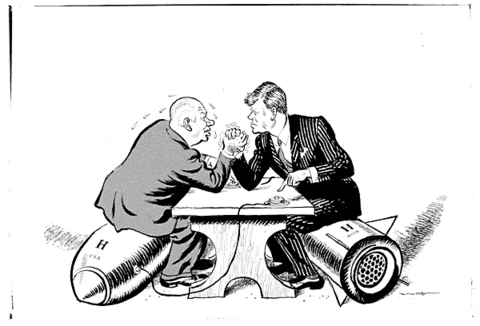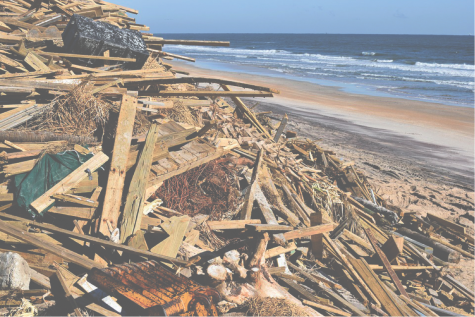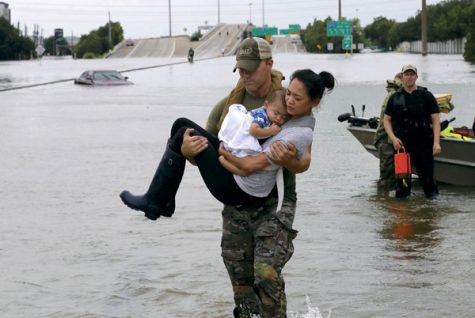Cold war tensions linger due to water and oil

Cold war tensions are rising again. Photo courtesy of desire2learn.com
The two most imperialist countries have been igniting tensions again.
Russia is trying to reclaim the territory it lost when the Soviet Union ended in 1991 while the United States is trying to protect its oversea assets. The countries that gained territory or became newly sovereign include: Kazakhstan, Uzbekistan, Kyrgyzstan, Turkmenistan, Tajikistan, Georgia, Armenia and Azerbaijan, all of which are a part of Asia. In Eastern Europe, the six new or restored countries are Estonia, Latvia, Lithuania, Belarus, Ukraine and Moldova.
Unfortunately for Russia, the small sovereign countries have allies with financially important resources in these small countries. Georgia, for example, has a BP-owned and operated pipeline a couple hundred yards from newly-claimed Russian territory. BP is one of the largest oil and gas companies in the world, and the U.S. would be losing lots of money if the pipeline was sabotaged.
The United States on the other hand has “close to 800 military bases in over 70 countries,” said David Vine the author of “Base Nation” in an interview with NPR.
The bases are spread out throughout the rest of the world, with high concentrations in Europe, the Middle East and southeast Asia. Most people don’t want foreign military in their country.
Now that technology has allowed us to deploy from home, maybe we should reconsider our forward bases. Also, the United States also has a history of arming insurgent groups such as the Afghan Mujahedeen in the ‘80s. Battle-hardened members of the Mujahedeen formed al-Qaida a decade later.
Arming the lesser of two evils is not sustainable. Once the “underdog” armed force takes over, they have transformed into the greater of two evils.
This creates a vicious cycle, leaving the U.S. military in a tough spot. They still have their financial assets at risk, so it must step in. And when they do, the U.S. will be fighting a power it created through funding and training.
To add to this mess, climate change is opening up new trade routes in the Arctic. The melting of the sea ice is causing an uproar as to who gets ownership of the waterways. Russia has claimed ownership, but the U.S. says the waterways ought to be shared by everyone so they can use it without having to pay.
As our population swells, there will be a high demand for fresh water. Glaciers hold around 75 percent of the world’s fresh water. Since the Industrial Revolution, glaciers have been melting at an exponential rate. Our water needs are increasing, the ownership of the waterways that hold most of the fresh water is under a heated debate and droughts are becoming more common.
Fresh water and oil — there will be a demand for both well into the future, but will there always be a constant supply?
The two largest military powers in the world, U.S. and Russia, are claiming the same land on multiple fronts. Both countries also own 93 percent of all the nuclear weaponry in the world. Only seven other countries have nuclear weapons at their disposal.
How civil have we been in the past, when Little Boy and Fat Man were dropped over Hiroshima and Nagasaki, when only 50 years ago, Jim Crow laws were finally abolished by Lyndon Johnson and when in Iraq there were over 100,000 civilian casualties compared to almost 5,000 U.S. soldier casualties?
How civil can we expect ourselves to be, when cities start to go under water due to rising sea levels, when our freshwater reserves have all melted into the undrinkable sea? When we spy on our own people out of a blind fear, doing so unconstitutionally in an effort to catch domestic terrorists that Fox News would have be believe are a dime a dozen?
Cold War tensions are rising again. The greatest flood in human history, our ocean, is rising at a rate of three inches every 50 years, and doing so at a slightly accelerating pace. Average temperatures are also rising. With all of these problems rising at a quickening pace, how long will it be until human decency drowns in the remnants of once great cities?
Nick Sallen is the opinion editor for The Dakota Student. He can be reached at [email protected]














